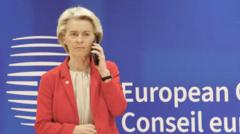In a groundbreaking decision, the European Court criticized the European Commission for withholding text messages between Ursula von der Leyen and Pfizer CEO Albert Bourla, stemming from key vaccine negotiations in 2021.
European Court Orders Release of Ursula von der Leyen's Pfizer Messages

European Court Orders Release of Ursula von der Leyen's Pfizer Messages
Court declares European Commission’s refusal to disclose communications during vaccine negotiations as unjustified
The European Commission has been ordered by the EU's General Court to release previously hidden text messages exchanged between its president Ursula von der Leyen and Pfizer's CEO, Albert Bourla, during crucial negotiations for Covid-19 vaccines. The ruling comes after the Commission's refusal to disclose these communications was deemed unacceptable by the court, which pointed out the lack of a coherent rationale for the decision made in 2021.
The case has drawn significant attention, particularly under the label “Pfizergate,” as it raises questions about transparency and accountability within the EU. Anti-corruption advocates, including Transparency International, celebrated the ruling as a pivotal moment for increasing transparency in European governance, emphasizing the need for an end to restrictive information practices.
Initially triggered by New York Times journalist Matina Stevis, who uncovered von der Leyen's private dealings with Bourla post-approval of the Pfizer-BioNTech vaccine, the controversy evolved when Alexander Fanta, a German journalist, sought access to the messages via a Freedom of Information request, which was subsequently denied. The court noted that the European Commission could not adequately justify its decision not to search beyond conventional record-keeping protocols for the text messages.
This latest ruling is particularly challenging for von der Leyen, who took office in 2019 and secured a second term last year, as it puts her leadership and transparency in the spotlight amid ongoing discussions about the management of the vaccine procurement process. With the Commission acknowledging the need for a thorough review of the ruling, the implications for transparency in official communications within the EU could be far-reaching.
Following the decision, the Commission is expected to re-evaluate its practices regarding the archiving of mobile communication, a grey area in its transparency commitments, especially given the implications of potential document deletion and the management of mobile data in official capacities. The ongoing scrutiny is poised to keep the story alive as both media and public interest in the transparency of vaccine negotiations continues to grow.
The case has drawn significant attention, particularly under the label “Pfizergate,” as it raises questions about transparency and accountability within the EU. Anti-corruption advocates, including Transparency International, celebrated the ruling as a pivotal moment for increasing transparency in European governance, emphasizing the need for an end to restrictive information practices.
Initially triggered by New York Times journalist Matina Stevis, who uncovered von der Leyen's private dealings with Bourla post-approval of the Pfizer-BioNTech vaccine, the controversy evolved when Alexander Fanta, a German journalist, sought access to the messages via a Freedom of Information request, which was subsequently denied. The court noted that the European Commission could not adequately justify its decision not to search beyond conventional record-keeping protocols for the text messages.
This latest ruling is particularly challenging for von der Leyen, who took office in 2019 and secured a second term last year, as it puts her leadership and transparency in the spotlight amid ongoing discussions about the management of the vaccine procurement process. With the Commission acknowledging the need for a thorough review of the ruling, the implications for transparency in official communications within the EU could be far-reaching.
Following the decision, the Commission is expected to re-evaluate its practices regarding the archiving of mobile communication, a grey area in its transparency commitments, especially given the implications of potential document deletion and the management of mobile data in official capacities. The ongoing scrutiny is poised to keep the story alive as both media and public interest in the transparency of vaccine negotiations continues to grow.





















